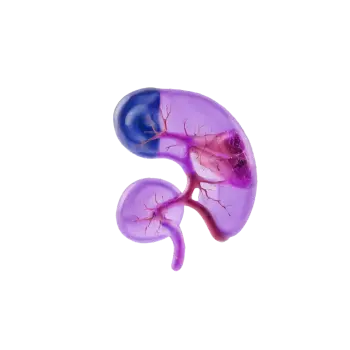Quick version
Interpreting abnormal kidney values is a complex process that requires a comprehensive assessment of creatinine, cystatin C, and eGFR, combined with the patient’s clinical symptoms and individual circumstances. While marginal deviations are often temporary and related to factors such as dehydration, fasting, or physical exertion, they may, in some cases, indicate underlying issues that need to be addressed.
Elevated creatinine and cystatin C levels or low eGFR results can be early signs of chronic kidney disease or other medical conditions. Even subtle findings, such as albuminuria without changes in eGFR, may indicate damage to the kidney’s filtration system. It is therefore essential that such abnormalities are followed up with new tests under stable conditions to determine whether further investigation or treatment is required.
Symptoms such as fatigue, swelling, changes in urination patterns, or high blood pressure can strengthen the suspicion of impaired kidney function and should not be ignored. Early diagnosis and management of potential kidney damage can improve prognosis and reduce the risk of complications such as kidney failure.
Kidney failure and impaired kidney function are relatively common conditions often detected through blood tests during routine health check-ups. Many patients present with marginal abnormalities in kidney-related markers such as creatinine, eGFR, and cystatin C. These deviations do not necessarily indicate severe kidney damage but may signal an underlying issue that warrants further investigation. In most cases, marginal abnormalities are temporary and related to factors such as dehydration, fasting, or recent medication use prior to testing.
At the same time, these findings may sometimes serve as early indicators of chronic kidney disease or other medical conditions requiring treatment. This article provides an overview of the most common blood tests used to evaluate kidney function, common causes of abnormal results, and recommendations for maintaining and improving kidney health.
The tole of the kidneys and the importance of blood tests
The primary function of the kidneys is to filter the blood and remove waste products while maintaining the body’s fluid balance and stable electrolyte levels. When blood tests reveal abnormalities in markers such as creatinine, eGFR, or cystatin C, it can raise concerns about kidney health.
Key blood tests to assess kidney function
To evaluate kidney health and function, several blood tests are used to identify both early and more advanced signs of impaired kidney function. These tests help physicians gain a comprehensive understanding of how well the kidneys filter blood, manage waste products, and regulate the body's electrolyte balance. By combining multiple markers, more accurate diagnoses can be made, which is especially important for detecting chronic or progressive kidney disease at an early stage. Below are some of the most common and useful blood tests for evaluating kidney function.
Creatinine – A common first indicator of kidney failure
The kidney marker creatinine, a waste product from muscle metabolism, is often the first marker of interest. Its level in the blood is influenced not only by kidney filtration capacity but also by factors such as muscle mass and temporary dehydration. Therefore, it is important to interpret creatinine levels in relation to individual characteristics.
Cystatin C – A sensitive indicator of early changes
To gain a more comprehensive view of kidney function, cystatin C can also be analyzed. Unlike creatinine, cystatin C is less affected by muscle mass and is therefore considered a more sensitive indicator of early changes in kidney function.
eGFR – An estimate of kidney filtration capacity
eGFR (estimated glomerular filtration rate) is a central parameter for assessing kidney function and is used to estimate how effectively the kidneys filter blood per minute. Various methods are used to calculate eGFR, depending on the marker analyzed and patient-specific factors such as age, sex, and, in some cases, ethnicity.
eGFR based on creatinineThe most common method for calculating eGFR uses creatinine, a waste product from muscles. This method is practical and often sufficient to detect changes in kidney function but has its limitations. Creatinine is influenced by muscle mass, diet, and other factors, which can result in misleading values, especially in patients with low muscle mass, the elderly, or malnourished individuals.
eGFR based on Cystatin CCystatin C is a protein produced by all cells in the body and excreted through the kidneys. Unlike creatinine, cystatin C is not affected by muscle mass or diet and is considered a more sensitive indicator of kidney function, particularly in the early stages of kidney impairment. This makes it useful for patients where creatinine-based eGFR calculations may be unreliable, such as the elderly or individuals with low muscle mass.
Combined eGFR CalculationTo improve accuracy, a combined method using both creatinine and cystatin C in the eGFR calculation is sometimes employed. This method reduces the risk of misinterpretation and provides a more reliable estimate of kidney filtration capacity. Combined calculations are often used when kidney disease is suspected or when results from creatinine- and cystatin C-based eGFR differ significantly.
Interpreting test Results
Interpreting kidney-related test results requires a careful holistic assessment, including multiple parameters such as creatinine, cystatin C, and eGFR, along with the patient’s clinical picture and any symptoms. It is essential to remember that a test result should never be interpreted in isolation.
A normal eGFR above 90 ml/min/1.73 m² generally indicates good kidney function. However, marginal deviations are not uncommon, particularly in connection with fasting or other temporary factors such as dehydration or changes in protein intake. During routine health check-ups where tests are often performed fasting, this can influence eGFR calculations, as fasting sometimes leads to slightly elevated creatinine levels, resulting in a lower eGFR value.
Marginal deviations in kidney testsMarginal deviations in creatinine and eGFR can be entirely normal and temporary. eGFR values just below the normal range, such as between 60 and 89 ml/min/1.73 m² in an otherwise healthy individual, do not necessarily indicate impaired kidney function. In many cases, this is due to temporary factors, which often include:
- Dehydration: A lack of fluids can temporarily increase creatinine and lower eGFR.
- Fasting or low protein intake: Can affect metabolism and result in altered creatinine and cystatin C levels.
- Temporary physical exertion: Exercise and intense activity close to testing can lead to a transient increase in creatinine due to muscle breakdown.
Deviations should, however, be assessed individually and followed up with a new test under stable conditions before drawing any conclusions.
When Is follow-up recommended for abnormal kidney tests?
Follow-up of kidney values is crucial for the early detection and treatment of potential kidney damage or diseases. While some abnormalities may be temporary and harmless, specific situations require repeated testing and extended evaluation to ensure optimal kidney function. This is particularly important when multiple markers show abnormalities or when deviations are combined with symptoms that may indicate impaired kidney function.
Follow-up is especially recommended in the following cases:- eGFR: When test results show values below 60 ml/min/1.73 m² or declining trends over time.
- Creatinine: Elevated concentrations compared to previous tests without a clear explanation, such as dehydration or temporary factors.
- Cystatin C: Elevated levels, especially when creatinine and eGFR results are inconsistent.
Symptoms to consider when interpreting kidney tests
Abnormal test results should always be evaluated in relation to symptoms or discomfort. The following symptoms may indicate underlying kidney disease and strengthen the need for further investigation:
- Fatigue and weakness: A relatively vague symptom that may be a sign of waste product accumulation in the blood.
- Swelling in hands, feet, or face: Indicates the kidneys are not regulating fluid balance effectively.
- Changes in urination patterns: Reduced output, dark urine, foamy urine, or blood in the urine.
- High blood pressure: A common indicator of impaired kidney function.
- Nausea and loss of appetite: May signal more advanced kidney damage.
When abnormal test results are combined with these symptoms, a physician should be consulted for further evaluation and treatment.
Recommendations for suspected kidney failure or symptoms
To maintain good kidney health, regular health check-ups are recommended, particularly for individuals with risk factors such as diabetes, high blood pressure, or a family history of kidney disease. By following up on abnormal values and addressing symptoms promptly, you can help protect kidney function and prevent more severe problems. If you have concerns about your kidney values, consult a healthcare provider for advice and further investigation.
By addressing abnormal values and symptoms in a timely manner, you can help safeguard kidney function and prevent more severe complications. If you have questions or concerns about your kidney values, do not hesitate to contact a healthcare provider for guidance and support.























